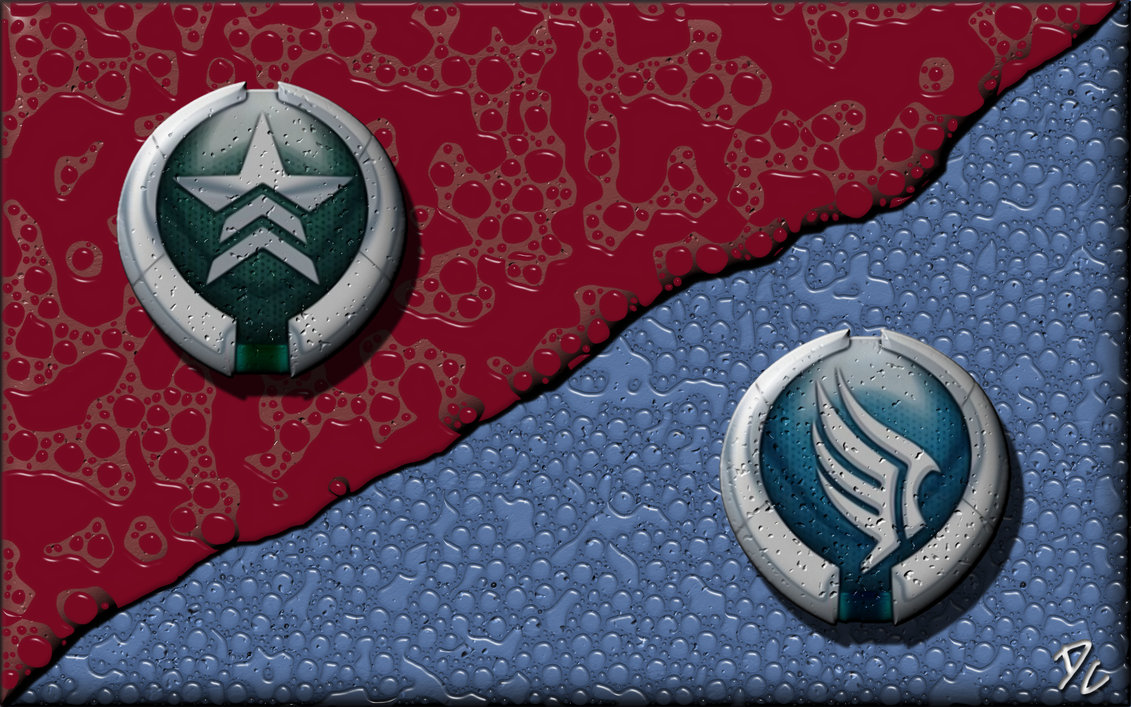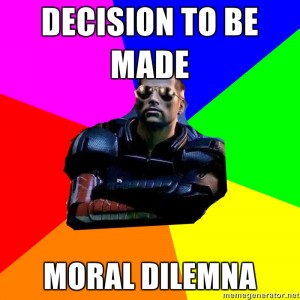This post has not been edited by the GamesBeat staff. Opinions by GamesBeat community writers do not necessarily reflect those of the staff.

Just as the idea of "go where you want, when you want" spawned the sandbox game, the "do what you want how you want it" attitude followed and naturally led to the birth of moral choice systems.
No longer does the gallant prince have to scale a tower and rescue a princess from the evil dragon's lair. Now, when confronted with insurmountable odds, you can simply toss the princess into the dragon's mouth and make a run for it. Donate money to a homeless beggar? Let's just mug him for what change he's got!
SURE you get some "bad" points, but the majority of the time the worst consequence is that the NPCs will stop kissing your ass and your tech tree takes the "evil" path.
The moral choice system seems to have become a staple of every RPG and big name action game released off late: Mass Effect, Infamous, Dragon Age, even the Bioshock series. Like the latest Lil' Wayne single, it's become all the rage for reasons we can't explain.
But I'm not onboard with it quite yet.
Don't get me wrong, I'm not saying that any of the games I listed above aren't great games. I'm just saying that having moral choice systems didn't exactly enhance the gameplay experience.
For example, in Mass Effect 2, I received a prompt during a cut-scene to kill an enemy lieutenant by shooting a fuel tank underneath him to burn him to a crisp and as a result, received some arbitrary bad-guy points. HOWEVER, when I reloaded my save-point, I chose to let the cut-scene end and ended up killing the lieutenant anyway with my incendiary rounds, burning him to a crisp. In theory, this action caused my colleagues to get "killed" during combat, but I was rewarded with good points nonetheless.

HOW was saving myself the trouble evil?! How was protecting the lives of my squad somehow worse than giving a warmonger a chance to monologue? I am sorry that I did not want to hear the guy give his hate speech, but I'm not Gandhi!
There are even more morally ambiguous choices in games, such as needing to threaten a nun with death in order to release a prisoner held in a town who would be of great aid to your quest. Sister Stupid, you do realize that my mission is to rid the land of a wave of Orcs that will eventually burn down this town right? And that you keeping this guy imprisoned for arbitrary and convoluted reasons is actually kind of selfish right? I'm still evil? Fine, f*ck it, give me the key or I'll slice your throat.
I understand the developers are trying to add "depth" to the game, but my gameplay experience has actually been eroded from such "moral choice" scenarios.
I'm not completely against moral choice scenarios; just like sandbox combat or regenerating health, moral choice scenarios are a step that needs to be taken for gameplay to be advanced. But just like sandbox combat or regenerating health, moral choice must be executed with caution.
The biggest problem that comes with "moral choice" is that, simply put, people have different morals.
Moral choice systems assume everyone is either a sociopath or a saint, when in reality 99.9% of the gaming community is in the gray area. The assumption seems to be that in any given situation the only given choices are negotiation or physical violence with negotiation being infallibly good while physical violence makes you Hitler.

But is making a judgment call on whether or not to execute an enemy lieutenant in order to spare harm to your teammates really "bad"? Is it worse than purposefully letting him monologue before sending his veteran troops at you? Which one is the "bad" choice?
It's no coincidence that "choose your own adventure" books never go on to win literary awards. The best stories don't give several watered down, subjective outcomes; they craft the story as they see fit and simply bring the reader along for the ride. Similarly, the greatest story games have usually been linear adventures.

Silent Hill 2, Metal Gear Solid, and Max Payne 2 are all examples of games that keep "moral choice" to a minimum and deliver some of the most heralded adventures in all of gaming. But I understand that we can't just live in the dark, sticking to the "if it ain't broke why fix it" policy of game-making.
I personally believe that the most accurate "moral choice" system in gaming right now isn't really a moral choice system at all. Alpha Protocol, while overall being a mediocre game, established the right way to add moral freedom to a game.
It gives you different methods of dealing with people like negotiations, flattery, threats, etc. The game doesn't keep score or points or attach an arbitrary label of "good" or "evil" to the options. Instead, the success of your options is simply measured in how successful you are in completing the objective (if it involves punching someone, so be it). Without making the player feel "good" or "bad", it allows them to make their own choices based on their judgment instead of the developer's sense of "right and wrong".
Games don't need to tell us what's good and what isn't; they should let us do what we want and let the chips fall where they may.
That's true immersion.
